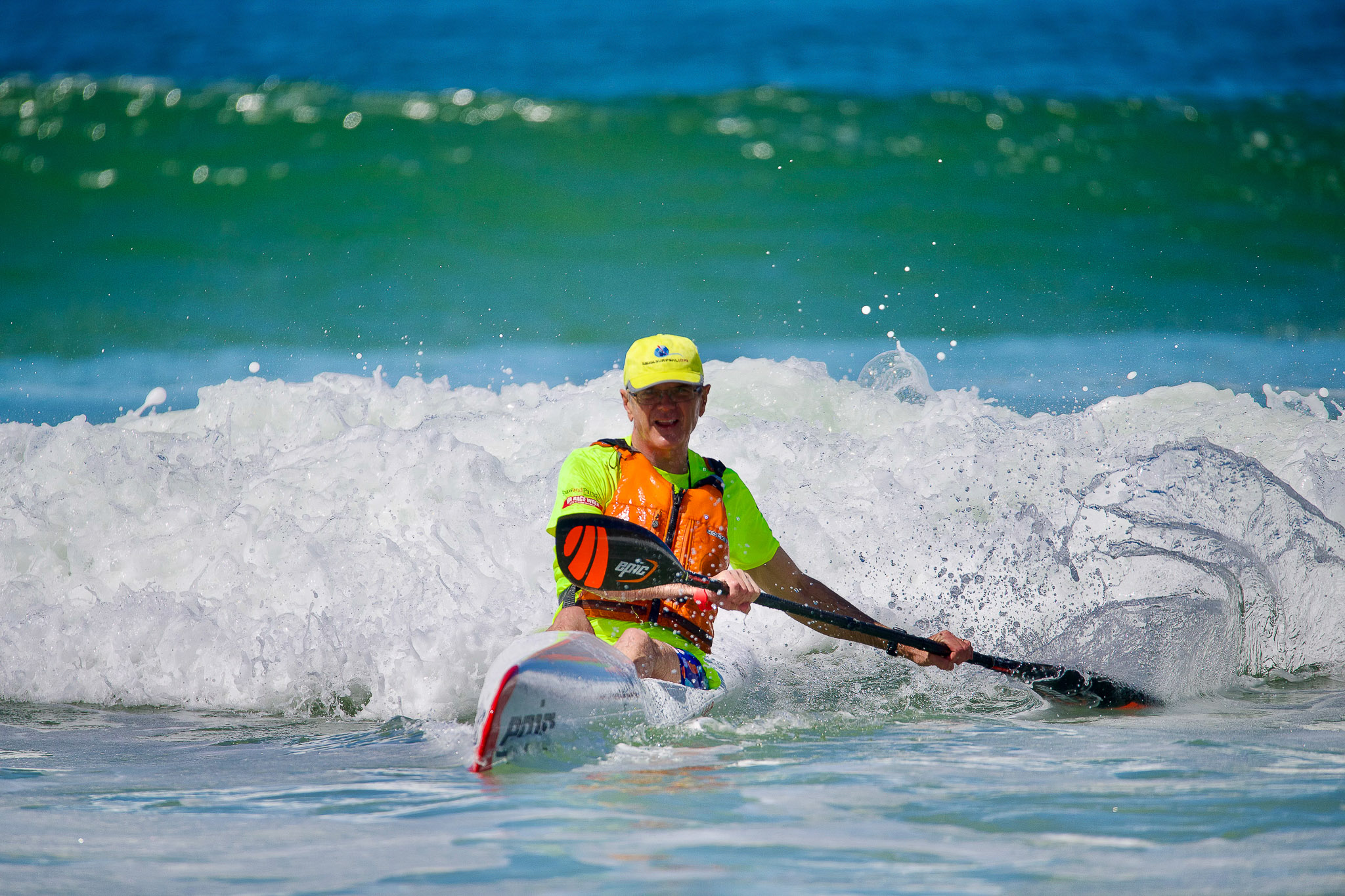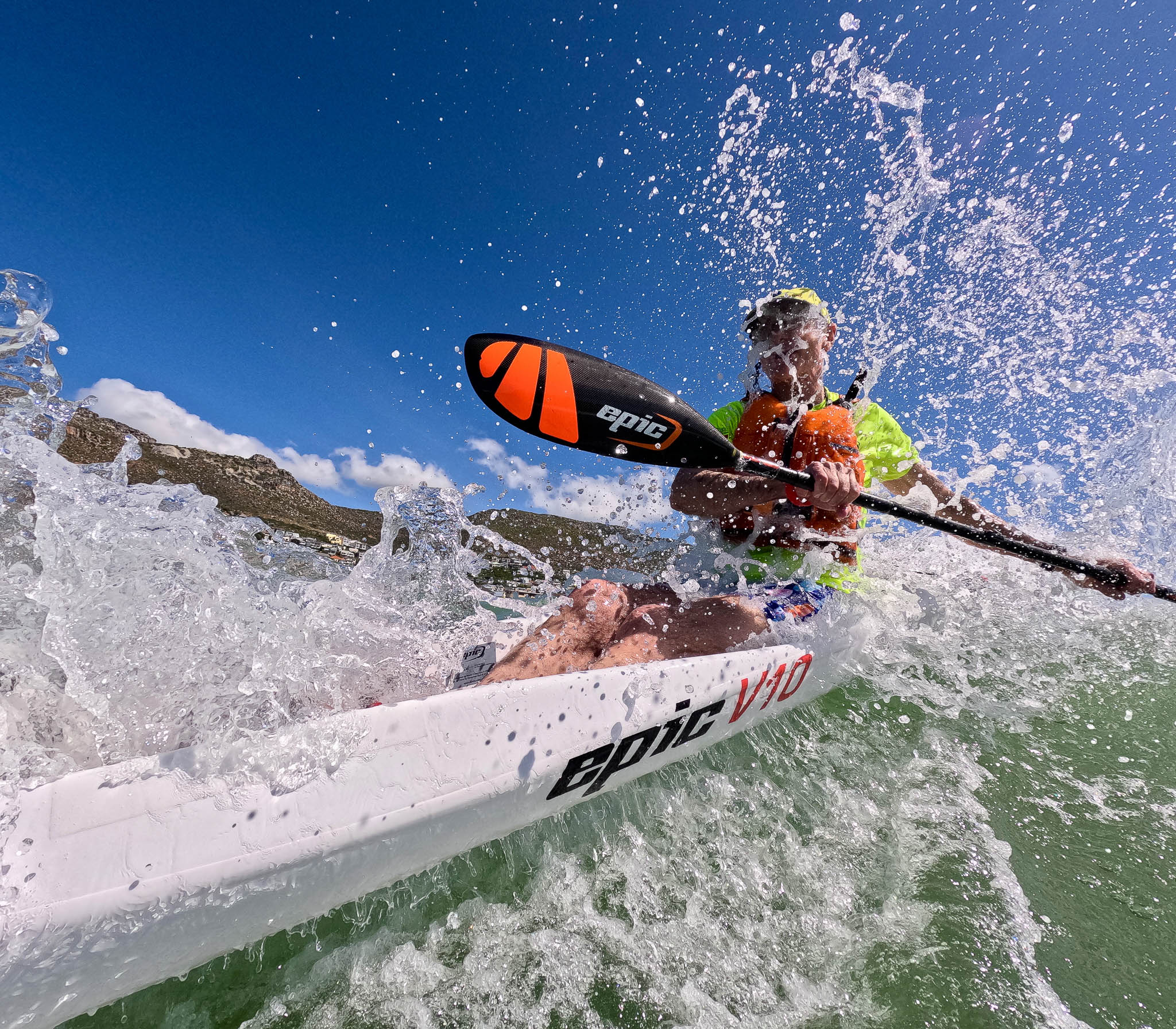“What the bloody hell are you doing here?” I thought to myself a few moments after launching on the brand new V10 4G for the first time. It was getting dark; it was raining; the squalls were lifting sheets of spray off the water… directly offshore. What WAS I thinking?
The answer is that I’m a sucker for new toys – and if I get my hands on one, I HAVE to play with it. Damn the weather, full speed ahead…
Since then I’ve paddled the boat many more times, in much pleasanter weather. Here’s what I think of this, the latest in Epic Kayak’s lineup of surfskis.
First Impressions
It was difficult of course to judge the boat on that first paddle; besides the “oh-my-hat-I’d-better-not-lose-it” thoughts, I was too focused on surviving the conditions. But two things were clear: my coccyx was compatible with the seat (hooray!) and the ski was very stable. As I made my way along to the coast, hugging the shoreline, side-on to the gusts, whatever else I was feeling, I wasn’t afraid of falling out.
The next day, when the weather had calmed down, I was able to spend some time examining the boat itself.
Firstly, the build quality is truly extraordinary. Epic Kayaks have been building surfskis since 2005 and have well-deserved reputation for the excellence of their boats’ strength and appearance. The hull is rock-hard, the seams are dead straight, the gel-coat wrinkle free.
The footplate, the well tried and tested tiller bar assembly, the rudder pedals and the rudder itself all scream “quality”.

Comfort and Stability – the cockpit
My coccyx is notoriously challenged when it comes to surfski seats: I found my old and beloved Fenn Swordfish S seat so uncomfortable that I had to install a bum pad to stop my backside being rubbed raw; older generations of the V10 had the same issue for me (although to be fair, I seem to be in the minority – most of my buddies don’t suffer the same defect!). In any case, I’m delighted to report that this update of the V10 is compatible with my backside – the seat is one of the most comfortable I’ve ever used.
(Just a side note: I didn’t appreciate just how important comfort is until I paddled the Carbonology Zest X. I had owned an earlier version and was extremely familiar with it. I found the X model to be a significant improvement, but couldn’t figure out whether it had more rocker, less volume or why it handled so much better. The answer – from an amused designer – was simply that the seat had been redesigned. Better comfort; better performance.)
The rails on the V10 4G are low (over 1cm lower than the Swordfish’s for example) and that contributes to the ease of remounting – which I experienced firsthand at the start of a race when I was the only one not to make it over the last wave of an incoming set…
Hull strength
Of course, it’s difficult to assess the strength of any hull until you break it!
But not making it over the last wave of the set described above, was only the beginning… it took me another five minutes, multiple poundings by the next set and another swim finally to get out beyond the break to start my race. The rest of the field had disappeared out of the bay, and I nearly made an expletive-laced quitting decision. (I didn’t and managed to catch the back markers by the half-way mark, and finished happy that I hadn’t come last.)
But here’s the thing: I was very aware that the spectators knew that I was on a brand-new boat. They were delighted by the first wave, which provoked raucous laughter and “helpful” comments – but they became quieter and quieter as my struggle continued. Both they and I were genuinely concerned that the boat might have sustained damage.
Happily, not even a scratch; I was most concerned about the rudder, having been violently thrown backwards by the breakers, but it was undamaged.

My boat is the “Ultra” layup (11.9kg) – which features a composite skin made of Kevlar fabric, carbon fiber and fiber glass, vacuum bagged over a Nomex honeycomb core and coated with heat-cured epoxy. The result is a rock-hard and seemingly durable hull. No soft spots here.
The “Elite” layup boat (10.6kg) uses the same core but is skinned with 3k carbon fiber.
The boats are listed on the Epic website at $4,695 and $5,295 respectively.
What’s Different about the 4G?
Each iteration of the V10 has led to increased stability – and I find this one phenomenally stable. At my advanced age (60), stability is becoming increasingly important. I feel pretty much bullet-proof in my old Swordfish S – and the same is true of the V10 4G.
The 4G has been given slightly more rocker than its predecessors, but the biggest change, perhaps, is that it’s been given a nose similar to the distinctive shape of the V12 3G: finer, less volume. More on that later.
Epic themselves say that the boat is designed for downwind paddling, the rocker and nose giving “the best downwind performance yet of the V10 series”.
What’s it like to paddle?
One of the joys of Cape Town is that we can paddle the whole year round. In summer the prevailing southeaster powers our famous/notorious Miller’s Run; in winter cold fronts bring northwesters and we simply go the other way. The “Reverse Miller’s” tends to have smaller, cleaner conditions, the conventional Miller’s can vary dramatically – but usually offers bigger, sometimes confused seas.
Suffice to say that I've paddled the V10 in a wide variety of conditions, downwind, upwind and on the flat.
Is it slow on the flat?
You might expect the 4G to be slow – after all it has “increased rocker” plus it’s an “intermediate” boat with the stability associated with greater hull width and consequently, drag, than its slimmer brethren.
What didn’t help was that when the boat arrived, I’d just come out of a series of fitness challenges – injury, covid and surgery – and I wasn’t back to my A-game.
But suffice to say that as the weeks went on, I went from being at the back of our training squad to holding my own with my peer group, even raising some eyebrows during squad sprint intervals.
My conclusion is that the extra width probably does affect the boat – but only in comparison the V12s/V14s of this world and not at the speeds that I paddle at. During those sprints, I was sustaining 11.7-11.9kph, surging onto tiny bumps on the water’s surface. For me, that’s a decent speed. (In any case I regard flat water paddling as a necessary pain – and mere training for downwind.)
[Editor: Sune Wendleboe (engineer, photographer extrarordinaire and mad keen surfski paddler) has owned no fewer than 27 surfskis in the last few years. He recently took delivery of an Epic V11 Elite and in this article shares his impressions of the sleek black paddlling machine...]
Just how do you go about improving one of the all-time classic surfskis? Epic Kayaks just launched the third generation V10 – and I spoke to Greg Barton, Epic's CEO and chief designer, to find out how and what he changed in the design.
Sune Wendleboe is a mad keen Danish paddler living in Oslo, Norway; he's owned 16 surfskis in the 6 years he's been paddling! He's just had the opportunity to try out no fewer than four of the latest, fastest elite level surfskis from around the world. Here's what he found.
The jetlag is still pretty bad; at 6am my body tells me it’s really midnight and I should be deeply unconscious. I reach across for my friend the iPhone (bought a local sim at the airport, HK$88 for 7 day unlimited data plan, awesome!) to check the latest weather forecast for race day…
Latest Forum Topics
-
- Surfski Width x Length Chart - 5th March 2025
- 4 days 23 hours ago
-
- Nelo models getting confusing
- 6 days 13 hours ago

